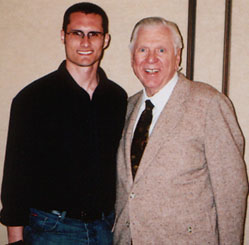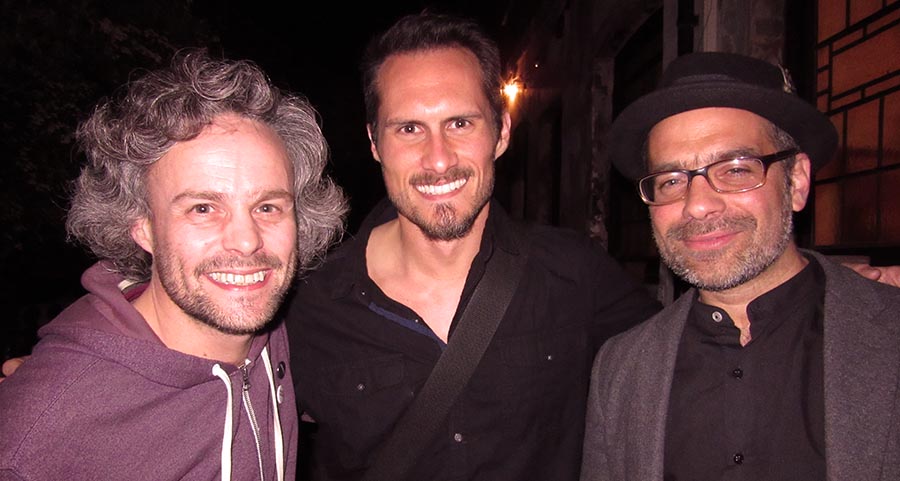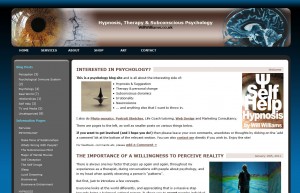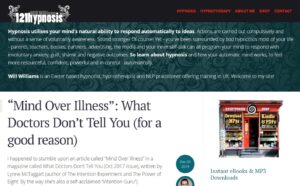Thanks for finding my site – I hope it’s at least vaguely interesting.
I’m Will Williams, and live in Devon, UK. I mostly read psychology, think too much, enjoy music (e.g. Nine Inch Nails, Kyla La Grange, Depeche Mode, ambient electronica), movies on a projector wall (e.g. David Lynch, Kubrick, Coens), retro-gaming, VR, and keeping my dog Arrow entertained. I also sometimes sketch rubbish pictures. Contrary to the fashionable ‘my life is great’ rhetoric typically spouted online, I’m by no means contented. I’m forever searching for something to truly belong to, a way of helping people in an efficient, meaningful way, and a way to somehow fully express all the stuff that floats around in my head about life, human nature, hypnosis, automaticity etc.
I’ve lived in Leicestershire, Devon, Coventry, Gloucester, Cheltenham, West Yorkshire, New York, Exeter and Atlanta before settling in a small town back in Devon.
My Perspective & Motives
Something I’ve come to fully appreciate during my life and work are two main forces people struggle with every day.
First, the barriers. The negative affects of low self-worth and limiting self-expectations. The commonality of a childhood of invalidation, neglect, criticism, disapproval or physical/emotional threat creating all manner of defensive, protective responses and overcompensations. The prevalence of trauma at any stage of life, which can be overt or more invisible by way of unprocessed implications of the self. Feeling powerless, a lack of control, feeling unsafe, or feeling broken and ‘less than’. These vulnerabilities can easily lead to being held back in life, crime, antisocial behaviour, self-harm, addictions, extremist indoctrination or at best, just never knowing one’s full potential or knowing what it’s like to be free of those self-limiting beliefs.
Second, the potentials. People do what they do because in their own bubble of subjective reality, it makes sense to them – even if they’re unconsciously discounting other important values, not empathising, or haven’t learned required skills (whether social, self-regulation, or meeting/managing their own needs in healthier ways). The point is that raw, innate motive always exists, and has huge potential to be liberated from the shackles of fear, anxiety, trauma and unfulfilled needs. I’ve seen hugely inspiring transformations, and it’s not always about a person changing, but developing enough self-awareness, emotional regulation, social skills, and truly understanding (and unravelling) their belief systems to meet their true goals and aspirations more effectively.
We’re all somewhere on that journey.
The universality of the human condition is why connection, empathy, listening and openness to experience is so important – we’re all influencing ourselves and each other all the time for better or worse, with every encounter, outburst, decision or experience. Everything has a suggestive power on the mind.
Learning more about how the mind works, how unconscious automaticity works, and how that greater understanding can be utilised for better outcomes (e.g. therapeutics, or mapping out how all your unconscious triggers and responses tie together) can be hugely useful for mental health, better connections with others, and ultimately a happier experience.
This site was written with that goal in mind – not to sell you something, or market myself, but to sew enough small seeds of pondering and wondering that further, more useful ideas or awarenesses might grow.
My Own Journey with Hypnosis & Therapy
Around the age of 16, I discovered the excellent book Psycho-Cybernetics by Maxwell Maltz. It opened my mind to the idea of the subconscious mind and the self-image, which led to reading a flurry of hypnosis books (see some of my recommendations and collection). Perhaps because of this era I still prefer the older, retro titles to modern books. Whilst studying psychology and neuroscience at Keele University (UK) I was delighted to find that the library had a fair few good and rare books about hypnosis.
Later, whilst living in Cheltenham, I found a second-hand book shop had recently taken in a lot of books about the mind and hypnosis, so I bought most of them and delved back in. This was around the time that Derren Brown (British psychological illusionist) was beginning his Mind Control shows on C4, so it was a bit of a fad at the time. At some point I might get round to writing a list of my library with mini reviews, for anyone interested in studying the mind.
I then spent a weekend experimentally hypnotising a friend, which was a life-changing, fascinating experience. I’d read enough to try a variety of phenomenon, witnessing hypnotic responses that would be incredibly difficult to do consciously (to test against mere compliance or ‘playing along’). These included: a genuine shock response when seeing a doll levitate (because the subject was hypnotised to see me as invisible, it’s difficult to fake going pale with fear); and focusing the eyes on an imaginary point in space (hallucinating an object that wasn’t there). Post-hypnotic suggestions would continue far into the normal waking state, even if sat in a public cafe, the conscious mind then inventing stories to rationalise the sudden strange behaviour. The experience inspired me to do a hypnotherapy course, to try and legitimise my learning with qualifications and national registrars. Here I ‘learned’ hypnosis (not much beyond what I’d already learned by this point, and with many falsities or important things missing), hypnotherapy, psychotherapy and NLP (neuro-linguistic programming, which I don’t care for as much these days as an industry, but undeniably still has some useful ideas and skill-sets).
This stage of my more formal learning was strange. It was a double-edged sword of practicing to build confidence for working with people, but was also far more “relaxotherapy” oriented and disregarding of human emotional complexities. Very process-driven, with some vaguely naff ‘six-step’ style approach for whatever issue was presented. Useful for light-use casual stuff perhaps, but bizarre to think that any of the group would then go on to set up private practices. There was no ‘checking’ of understanding or skills, so as long as you showed up, you had a so-called qualification (and letters to put after your name! I still cringe when I see these on websites.) It was an iffy indoctrination to navigate. The problem is that the vast majority of self-proclaimed hypnotists still don’t understand basic suggestion psychology – I know because I’ve attended lots of other trainings/talks and been the guy asking awkward questions that lead to flustered responses. Most protect against this seeming paradoxical answer of “who cares, if it works, it works!” but for me, this isn’t good enough and leads to heavy confirmation-bias, as well as a pressure for clients to just comply. The problem is that the definition of hypnosis becomes far too wide, mostly being light relaxation, and some practitioners even go as far as to say that “everything is hypnosis”. In that frame, the concept of unconscious automaticity becomes lost at sea, ignored. My earlier experimental experiences felt like another world compared to the relaxotherapy side of things.
For me personally, self-study and experience was vastly important. I like to figure things out, have my own ideas and theories, test them, and develop in the process. Training can be excellent, but it can also definitely be overrated, ignorant and misleading. At worst, it can be destructive, because the trainer’s own (sometimes misguided) beliefs and understandings then unfairly contaminate the student. I refused to get sucked into the whole relaxotherapy and NLP thing, so studied psychotherapy to deliver more effective change journeys. I’ve never read aloud a single hypnosis script or relied on “suggestion therapy”. For me it’s all about causality, awareness and giving the client control over things which they had forgotten they were imagining. And all of course with absolute respect.
The industry really is still a mess though, with plenty of egos, defensiveness, competition with ever-hyped marketing and stacks of misunderstanding and irrationality. Sometimes I enjoy connecting with like-minds and discussing the good stuff, sometimes I find the various communities a little irksome. Sometimes, terrifyingly obnoxious. I’ve been banned from some Facebook groups just for asking good (i.e. inconvenient) questions. Never undermine a wannabe cult leader! (actually, do).
Professionally, I set up a hypnotherapy practice in Exeter in 2005, and had some great results with hypnosis with many clients, always honest, open and results-focused. Some of the case-studies were absolutely fascinating. The work I did was often quite intense and deep in helping people to explore what’s really going on in their heads. I’m a big fan of Milton Erickson and Gil Boyne, and adopted a flexible person-centred mix of both of their approaches.
I trained more with the great Ernest Rossi (who co-authored Milton Erickon‘s main books) in London, and then the late legend Gil Boyne in Los Angeles. This was an incredible week, Gil was my favourite hypnotist and it was brilliant to see him in action. I’m amazed that he doesn’t get more attention in the world of hypnosis, his philosophies and wisdom are vastly underrated (also, he worked with Sylvestor Stallone to help him write Rocky). In more recent years I delved into the excellent HeadHacking material from Anthony Jacquin and Kevin Sheldrake, and studied more solid research on hypnosis. I’ve now reached my own grounded understanding of things, and have a pretty firm model of how it all ties together with automaticity, imagination, and the sensation of conscious will. And hopefully, life’s curious problems.

legendary late Gil Boyne.

During my practice, I also worked part time at Royal Devon and Exeter hospital as a stop smoking specialist, which was great to provide some variance in a clinical setting. I also tutored an online Life Coaching course for Open Uni and later volunteered with the Shout charity for a while, as well as worked for the Devon Mental Health Alliance as a Recovery Practitioner. This was a great experience, although a terrible and even dangerous set-up (entry level practitioners are assigned to work with people ‘too complex’ for standard NHS talking services, usually meaning suicidal and/or with complex trauma. You aren’t allowed to provide any therapeutic practice at all – it’s all about guiding them to local volunteer-led support groups or activities. That’s an enormous pressure for someone taking barely above minimum wage and given very little support).
Somewhere during all this I stopped therapy work to take a break from the pressure, thinking and occasional healthy self-doubt, and develop a more consistent income through website design and small business marketing. During this time I wrote two books, and continued to study. These days I’m working on a big opus about automaticity, imagination, and the sensation of conscious will, as well as cults and indoctrination, but it’s been a struggle at times with everything else that’s going on. This site has become a mini-version of some of those ideas.
The break allowed some much needed time to reflect on hypnotherapy, which I now find in the majority to be a bit lacking. I am more and more leaning towards the viewpoint that the therapy industry should be driven towards education, skill and self-awareness development (like DBT) rather than half-baked techniques, superficial processes and inflexible journey-structures. More helping people to help themselves. The frame of ‘practitioner/client’ can imply a power dynamic or worse, ‘better than’, something that gets in the way of the required trust and openness. We’re all only human, and practitioners are more-often-than-not as troubled as the clients. The mind is a fascinating place, so learning more awareness for positive mental health, and avoiding the various trapdoors of bad thinking should really be taught as early as school.
About the 121Hypnosis Site Itself
I started writing a hypnosis and hypnotherapy site in 2004 to support my business as a hypnotherapist. I added pages here and there, but always felt frustratingly restricted by meeting the needs of potential customers (i.e. going down the commercial marketing road) and Search Engine Optimisation, which meant I had to frequently mention certain key phrases that people were supposedly searching for (I still do it here and there, I need to chase traffic somehow). In the end I got most of my clients through the website, so it worked out well, but I never felt that my interests, perspectives and approaches were particularly congruent with the site.

The original site (ouch!) was hosted by SBI (Site Build It) an American company led by ‘guru’ Ken Evoy. It cost $299 a year, was clunky as hell and had very limited functionality. Everything was done via a bunch of screens that took ages to load, which eventually discouraged me from wanting to update the site because it was such a pain-in-the-ass! So instead I did the whole thing myself by learning a bit of PHP and figuring out how to use WordPress.

The first ‘reload’ of the hypnosis site gave me the opportunity to be more congruent with myself, and hopefully connect with people a little more. The second revamp was in April 2011, and was mainly to make it feel a little less stuffy and more fresh so I would feel more encouraged to add to it. I fully acknowledge that the whole thing is now just a ridiculous exercise in self-indulgence.

The third revamp in August 2011 returned the main domain back to 121hypnosis.com. I felt this domain was more relevant than my own stupid name (I use that for my art crap now), and made the hypnosis site a bit more commercial so that I can actually try and do something more constructive with it.

I then changed the theme yet again with a funkier, more stylised approach. But it was so messy now with dynamic widgets, complex linking and trying to sell stuff that I gradually became disillusioned with it. It had become too incongruent with my values and where I was at. It was frankly embarrasing to read a lot of it.
So I took it offline for a while to rewrite it, resorted to a simpler theme with minimal customisation. Faster page loading and minimal clutter should make it a better and more efficient experience for readers (I hope).
I’m really glad you found it though, and even read this far. If you fancy saying hello below, that would be great 🙂

Leave a Reply